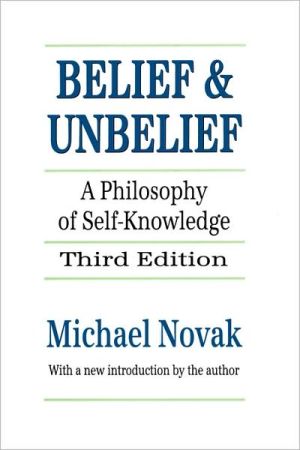

 |

|

The average rating for Belief and Unbelief: A Philosophy of Self-Knowledge based on 2 reviews is 3 stars.
Review # 1 was written on 2018-01-26 00:00:00 Matthew Corrigan Matthew CorriganThis is an early work by Michael Novak and is heavy into the philosophy of religion and the reasons for belief or unbelief. It will not necessarily change anyone's mind, but it does lay out the issues involved. Novak himself (he just died last year, 2017) was a Roman Catholic and a sometime seminarian (who dropped out) and he published this book in 1965, which reflects his thinking in the context of the turmoil the Church was going through at the time of the Second Vatican Council. |
Review # 2 was written on 2011-09-15 00:00:00 Russell Clark Russell ClarkBelief and Unbelief is not the book that I expected it to be. I was expecting Michael Novak, the somewhat famous Catholic philosopher, to be providing an apologetic for Christian belief. Rather than this, he examines the concepts of understanding and beliefs themselves and tries to analyze what could make two honest seekers of the Truth to come to two different conclusions about the existence of a personal god: belief and unbelief. My background in engineering wasn't a good foundation for comprehending a book with so much philosophy and psychology in it. That is perhaps one of the reasons it only merits two stars from me. There were parts in the book that to me seriously almost parodied how an intellectual can say a great deal without really saying anything. But after slogging through all the terminology that was foreign to me, I believe I came away understanding what he is basically trying to say. His theme is that to find God, one must look into oneself and try to seriously ask those big philosophical questions, especially, "Who am I?" Honest pursuit of these answers, he feels, brings one as close to belief as one can be without making the decision between belief and unbelief. For him, the honest Christian intellectual and the honest atheist are much closer to each other in truth than the Christian intellectual and the average church-goer who leaves the big questions unanalyzed and just assumes his faith to be correct. He nearly goes so far as to say salvation is nearer that atheist than the unreflective man or woman in the pew. To me, this is going much too far. His analysis is helpful in commiserating with the atheist and also recognizing the emptiness sometimes experienced by the honest Christian in view of what seems to be a universe in which God is silent and existence could as easily be interpreted to be absurd as to be the design of God. I have some big misgivings about some of his conclusions and methods. First, I should note that he comes across as overly ecumenical. As long as we are all honestly seeking the answers to the big questions and looking at ourselves without bias, it doesn't matter what we conclude because it will be pointing at God. Well... maybe not. That's putting an awful lot of faith in a fallen human nature to come up with the right answers. Also, Jesus Christ hardly gets a mention, and neither does Scripture. It is as if God is hidden and He never revealed Himself to us by the prophets in diverse manners and in the latest times through His Son Jesus Christ. How can a search for Truth and the answers to the big questions treat this revelation as not relevant? I'm baffled by this concession to the skeptics. Also, he seems so condescending to the average believer in the Church. Sure, we common believers are all very flawed and sometimes are the worst possible advertisement for the existence of God that the Devil could have ever designed. And yet there is something in old time religion that some intellectuals and philosophers don't belittle like Novak does. Fr. Benedict Groeschel, for instance, is a well known psychologist, priest, and author, and he finds the simple faith he sees amongst the elderly women of the African American churches to be something quite praiseworthy. I don't think Novak would see it that way. As a matter of fact, Novak seems to describe a way to discover God that is particularly suited to HIS OWN talents and interests: philosophy and intellectual pursuit. It would be just like a Christian social activist saying that God is found in Christian action. It's pretty convenient if God is found by doing what you already do and do well. But again, if you are an honest intellectual of agnostic, atheistic, or even Christian persuasion, you might find the book helpful and enlightening. For simple-minded me, I'll stick to the old-time religion, but look to gain some perspective and insights from Michael Novak's teachings in this book. |
CAN'T FIND WHAT YOU'RE LOOKING FOR? CLICK HERE!!!